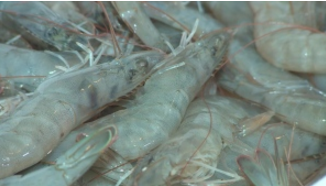In rural Ontario, 800 kilometres from the nearest ocean, you will find the unexpected — a successful inland shrimp farm.
With pork prices low, Paul and Tracy Cocchio were struggling to make a profit with their hog farm in Campbellford, Ont., so they started looking for alternative uses for their empty barns. While searching the internet they stumbled upon farmers in the U.S. who had switched to inland shrimp farming.
They decided to give it a shot themselves.
Shrimp is the most consumed seafood in North America and the majority of the shrimp eaten on the continent comes from Asia. But the industry there has become highly controversial because of labour practices and pollution.
- Slavery uncovered in Thailand’s shrimping industry
- Is the shrimp at your favourite restaurant or supermarket peeled by slaves?
“Shrimp is in just about every restaurant and it’s all imported. There are some Canadian harvests but they’re small and these bigger shrimp are all imported. So we knew there was a good market,” said Paul Cocchio.
The Cocchio’s converted one of their 60- by 12-metre hog barns into a tropical shrimp farm with 100 per cent humidity and 16 tanks filled with 29 degree water, but creating their company First Ontario Shrimp hasn’t been an easy process.
It took them three years to get Pacific white shrimp added to the list of species that can be farmed in the province and it took another three months to obtain an actual licence to farm them.
It also hasn’t been easy keeping the tiny crustaceans alive.
“We thought, ‘Oh, look at that: They’re all hugging each other, swimming around.’ And they’re not. They’re eating each other, they’re hungry,” said Paul.
All of the Pacific white shrimp they farm comes from Florida by 24 hour express mail and are only about the size of an eyelash when they arrive.
“They send us about 20,000 at a time. So we put them in a starter tank, look after them for three to four weeks in that starter tank. Then they go into a finishing tank for about four to four and a half months to get them to the size that we’re wanting,” said Paul.
Better for the planet — and us
The Cocchio’s son Brad has been involved in the operation from the beginning and takes great pride in what his family has been able to develop and how little impact it has on the environment.
“There is no water that leaves this place. It’s completely recirculating. There’s no filters or anything. Basically the bacteria that’s in the water is consuming the waste from the shrimp, the excess feed, all of that. And then when it flourishes the shrimp eat it,” said Brad.

“Our oceans are a limited resource and we’ve already seen that overfishing is the number one impact that we’re having on our oceans. So providing alternate sources of protein is going to be really essential in the future,” Geach said.
Closed shrimp farming is viewed as a much better alternative compared to open pond shrimp farming in Asia where feed, antibiotics, and any excess waste goes right back into the environment. A recent Associated Press investigation in Thailand also uncovered slave labour being used in the farming process there.
Tasting the profits
Toronto entrepreneur Marvyn Budd, meanwhile, aims to take shrimp farming in Canada to a whole new level. He is building a much larger shrimp farm in a former Imperial Tobacco plant in Aylmer, Ont..
“We’re starting with four production modules, each of which have long raceways that are each about the size of a football field,” he said.
“Eventually we’ll end up with 224 football fields and about 14,000 miles of shrimp production. That’s a lot of shrimp.”
Budd’s operation, called Planet Shrimp, won’t be up and running until June 2016. His company plans to produce 3,600 kilograms of shrimp a week to start and as they continue to expand the goal is to increase volume to more than 29,000 kilograms per week.
“We’ll be the focal point of the shrimp industry. I think we are going to change how shrimp is farmed all over the world,” said Budd.
Can’t grow enough of them
The Cocchio family is already changing the industry. After all of the challenges and steep learning curve, their farm is starting to have some success. They are harvesting almost 70 kilograms of fresh shrimp every week, but that’s still not enough to keep up with the orders.
Several restaurants in the Toronto area have been purchasing their shrimp for months now. Once a week or so, the Cocchio’s harvest the shrimp in the morning and drive their fresh product to their customers that afternoon.
“You really do taste that extra little bit of freshness that only being a couple hours out of town makes,” said Kevin Flaherty who works at Honest Weight seafood restaurant and fish counter.
They often sell out of the Cocchio’s product within a day. “Having shrimp right in our own back yard that we know are disease- and chemical-free is a real comfort for ourselves and of course for our customer base too.”
And Paul and Tracy Cocchio are pleased their idea many years ago to farm shrimp is finally paying off.
“Everything is a risk. If you don’t take the risk you don’t know,” said Tracy Cocchio.
Read the full post in CBC News Business


Leave a Reply